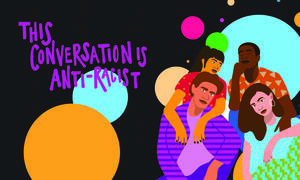1,360 Results
This Conversation Is Anti-Racist

The Social Justice Standards
The Social Justice Standards allow educators to use backward design when planning lessons and provide a framework for discussing social justice topics at every stage of K-12 instruction. Get to know the anchor standards, grade-level outcomes and the four domains of anti-bias teaching and learning—Identity, Diversity, Justice and Action—with the resources in this edition of The Moment.
- Lead Your Own Training: The Social Justice Standards
- Social Justice Standards
- Teaching MLK With the Social Justice Standards
National Suicide Prevention Week
National Suicide Prevention Week is September 8-14. And while educators can’t—and shouldn’t—act as mental health professionals, they can advocate for students. They can help create schools and communities where all children know they’re valued and loved and where support is available if students find themselves in crisis. We hope these resources will help.
- Demystifying the Mind
- We Can’t Lose Another Child to Suicide
- SMS SOS
Honoring the 55th Anniversary of the Selma March
This year marks the 55th anniversary of the Selma-to-Montgomery march for voting rights. Hundreds of activists, students and educators organized and marched bravely in the face of racist violence and arrests. Use these resources to teach how the Selma organizers achieved one of the most significant victories of the civil rights era: the passing of the Voting Rights Act of 1965.
- Jimmie Lee Jackson
- The Right to Vote (Transcript)
The Diversity of Asian American and Pacific Islander Identities
As we continue to celebrate Asian Pacific American Heritage Month, we hope educators commit to uplifting the diversity of AAPI identities year round. These resources offer ideas for including AAPI stories and valuing the lived experiences of AAPI people in our learning spaces, regardless of our own identities and those of our students.
- A Remote Control for Learning
- Teachers, Check Your Texts
- (In)Visible Identity
Advocate for the Well-Being of Black Children
Anti-Blackness is pervasive and has material consequences for all people, including and especially Black children whose presence is often overlooked—and, ironically, villainized—in favor of all things that uphold white supremacy. These LFJ resources offer specific actions educators, parents, caregivers and communities can take to insist upon the well-being of Black children.
- Partnering With Families to Support Black Girls
- Stop Talking in Code: Call Them Black Boys
- Ending Curriculum Violence
Take Action for Youth Justice
Started by the Campaign for Youth Justice, October is Youth Justice Action Month (YJAM), a time to “raise awareness and inspire action on behalf of young people impacted by our criminal justice system.” These resources explain how the school-to-prison and school-to-deportation pipelines all too often begin in the classroom. And they offer ways educators can interrupt these systems.
- Toolkit for "A Teacher's Guide to Rerouting the Pipeline"
- The School-to-Deportation Pipeline
- The Weaponization of Whiteness in Schools
Counter Censorship Efforts by Uplifting BLM at School
The annual National Black Lives Matter at School Week of Action for 2023 is February 6-10. The guiding principles behind this event can be an important frame through which to reimagine more liberatory educational spaces for Black children and—as these LFJ resources indicate—for all children. This Black History Month, be intentional in countering censorship efforts.
- Black Lives Matter Week of Action
- Bringing Black Lives Matter Into the Classroom | Part II
- Black Visibility Matters: The Inconvenient Truths of Bias and Erasure
Explore Honest History by Building Partnerships
To understand the complexities of the present, we must connect with the hard history of our country’s past. And we can learn about that honest history outside the classroom—in museums and field trips—because “No educator can accurately map out the whole landscape of our history alone. We are all stronger when we traverse the terrain together.”
- Partnering With Museums to Teach Honest History
- A Student’s Take on Sugar-coated History
- Preserving a More Honest History